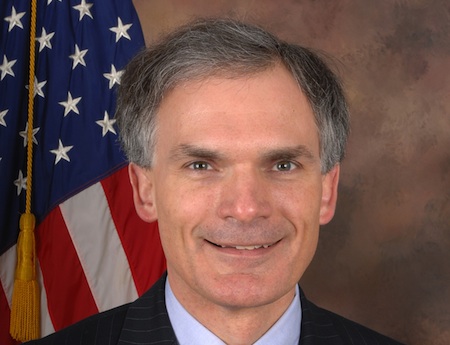Rep. Latta: Nixing Integration Ban Is Win-Win

The smarter way to stay on top of broadcasting and cable industry. Sign up below
You are now subscribed
Your newsletter sign-up was successful
In advance of what is expected to be a bipartisan vote Tuesday on a House Energy & Commerce Committee version of a bill reauthorizing the Satellite Television Extension and Localism Act (now christened the STELA Reauthorization, or STELAR, act), Rep. Bob Latta (R-Ohio) talked with B&C/Multi about the importance of scrapping the ban on integrated set-tops, which he says will save cable operator costs and consumer's on their energy bills.
Latta, vice chairman of the Communications Subcommittee, was instrumental in getting his CableCARD bill added to the legislation in the House Energy & Commerce Committee, a move strongly backed by cable ops.
Also in the bill is a prohibition on coordinated retransmission consent negotiations among non-commonly owned TV stations in a market, another provision strongly backed by cable ops.
The bill, including both provisions, is expect to pass with bipartisan support Tuesday in the House — it is being voted on the suspension calendar, which is a short-cut for noncontroversial bills.
Latta says he thinks the bill has a good chance of passing in the Senate.
Asked why it was important to get rid of the set-top integration ban, Latta said that for one thing, it didn't work.
"It did not do what it was supposed to do," he said, adding that the FCC had "taken off on their own on this."
The FCC had mandated that cable operators separate the security and channel-surfing functions in set-tops as a way to spur a retail market in the boxes. Both the commission and cable operators are in agreement that a robust market has not resulted from the ban. Latta has argued that the ban forced cable operators to make their set-tops as expensive and energy inefficient as retail boxes.
He said the ban has not done "anything close" to what the FCC said it was going to do. "I don't think Congress thought the FCC would go with this whole idea of having an integration ban that has cost consumers and operators at least a billion dollars."
Latta pointed out that at a hearing on another matter, the Secretary of the Department of Energy even mentioned the amount of energy being used by the boxes. "So, I think it is a win-win for consumers and operators. Consumers will have lower energy bills."
The cable industry has long argued that the ban on integrated surfing and security forced them to deal with the old technology of CableCARD security hardware while they were in the midst of developing a downloadable security system that would be cheaper, easier and more elegant. The result, they said, was unnecessary costs to the digital set-tops they lease to subscribers without providing any tangible benefit to consumers.
The FCC, under then-chairman Kevin Martin, concluded that while it recognized the advantages of downloadable security and encouraged it, it could not be sure the industry would deliver on the promises of that technology in a timely fashion.
The smarter way to stay on top of broadcasting and cable industry. Sign up below
Contributing editor John Eggerton has been an editor and/or writer on media regulation, legislation and policy for over four decades, including covering the FCC, FTC, Congress, the major media trade associations, and the federal courts. In addition to Multichannel News and Broadcasting + Cable, his work has appeared in Radio World, TV Technology, TV Fax, This Week in Consumer Electronics, Variety and the Encyclopedia Britannica.

